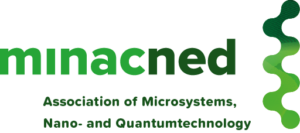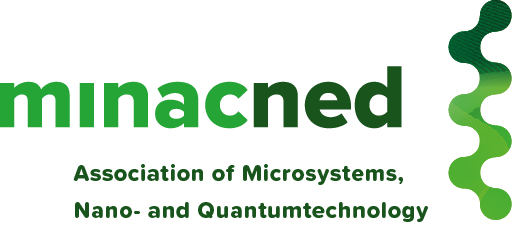Health
About Nano4Health
Introduction
Nanotechnology, a key enabling technology at the foundation of the Health sector. Nanotechnlogy contributes to a broad spectrum of applications in this sector, from enhancing drug development to the development of point-of-care products for decentralized diagnostics to a DNA analysis (next gen sequencing).
Nanotechnology has a huge societal and economic impact. Thanks to a good organizational structure The Netherlands have reached an international lead position in the area of nanotechnology. The Dutch government has also been made aware of the importance and impact of nanotechnology on the Health sector. Companies that make use of micro- and nanotechnology (nano inside) in the Health domain, are most typically in the scale-up phase of development and have applications both in the domestic and global domain.
Longer healthy living
Nano4health is aimed at the themes health and cure. Nanotech enabled solutions ensure that people can live longer with a higher quality of life and that they can take care of themselves, with personalized care. To reach up to five years longer quality of life is within reach with nanotechnology as a key element. The laboratory will go to the person more than the person will go to the lab, monitoring by nanotech can be done in a home environment.
Medication and treatment based on nanotech based microfluidics and lab-on-a-chip solutions will be applied individually. Nanotechnology based DNA analysis systems will be used to analyse the entire genome, intestinal flora, cancer cells and in a variety of ways. Organ-on-a-chip is expected to ensure faster drug delivery and an alternative for animal testing.
Nanotechnology will be key in improved drug delivery and contrast agents for imaging technology. Nanomechanical materials and structural quality reduce rejection processes in implants, make wearable medical measurement and monitoring instruments possible and patient friendly. The high tech SME’s and a clear market demand for solutions make for better chances of impact on the short and medium term. The time to market will mostly be influenced by regulation and financing.
Economic perspective
The ecosystem that has emerged has led to a large number of high-tech SMEs with scale up potential and a good basic infrastructure that will make the opportunities for economic impact much higher. The medical background of the research requires thorough research, validation and risk management.
These are necessary for an innovation to grow into a marketable, approved product. Research and development can take up to 15 years as a rule, rather than the exception. Investing in the existing ecosystem is therefore necessary to profit from the benefits of investments already done in The Netherlands. In addition, the highly specialized market for medical scientific research can be supplied with instruments and devices in the short term (0 – 7 years). Improved market access can be expected through collaboration with leading Medical Centers within the program. With sufficient investments, the export potential for the Netherlands can be maintained and the sector will become an even more important source of scale-ups and export income. Many markets and market segments in which nanotech is the key to growth are growing much faster than the average market. Market growth of more than 15% is no exception.
What is already there?
Nanotechnology is already being used in the Health sector. Consider for example personalised medicine, pre-screening of patients in a home situation, the smartphone as a personal medical assistant, organ-on-a-chip research technology, neural prostheses, societal reintegration of chronic patients (for example with the use of a wearable artificial kidney or insulin equipment for diabetic patients), monitoring of food.
What can we expect?
Nanotech enabled solutions will ensure that people can live longer with a higher quality of life, taking caring of themselves and living in their own home. Personalized care can be delivered by medical measuring and monitoring instruments. Also, nanotechnology will enable the individual specific medication and solutions to target drug delivery much more efficient, for example by use of localized chemotherapy.
Prospect
What will the future of health care look like in 2050? A health care system that focuses on keeping people heathy instead of focusing on the cure. Would it be possible to have a ‘digital twin’ of every citizen that contains all medical and health-based information? Nanotechnology is essential to gather information: nanotech based on superfast DNA analysis, with nano particles from ultra-sharp medical imaging (PET-MRI, CT and other), nano sensors like the ones in nano drugs, organ-on-a-chip based on a patient’s own cells and personalized medicine. All of these technologies contribute to lowering health care cost. With a Digital Twin preventieve medicine can be applied, the citizen or patient can live a longer and more independent life while organs on a chip can reduce cost of medicine. And if we start to see healthy food as a first step in prevention, a Digital Twin can also play a significant role in customized health care advice.
Applications
Society
Alternatives to animal testing, organ-on-a-chip, DNA analysis, nano sensors, wearables, insideables
Medication
Personalized medicine, food-body interaction, water filtration, (targeted) application of medicine, medical imaging
Care
Self management, home testing, wearable artificial kidney, neural prostheses and other applications
Personalised medicine
Lab/organ on a chip and microfluidics technology
DNA-analysis
Nanotech based
Self management
By (home) monitoring of health (wearables, insideables)
Nano medication
Targeted drug delivery and nanoparticles for enhanced imaging
News Nano4Health
KIEM HighTech
21 March 2024/by minacned2NGF: Future-proof hightech equipment
29 February 2024/by minacned2Recap iMNC23
2 November 2023/by minacned21st MinacNed regional event 2023
27 June 2023/by minacned2Quantum Delta NL SME programme
30 January 2023/by minacned2Matchmaking Nanotech Expo Japan: photonics, quantum and nanotechnology
5 December 2022/by minacned2Technologies
Clusters
Contact person




Visit LabNL and Electronics & Applications in the late summer!
From Tuesday 28 to Thursday 30 September, FHI and its partners will not only organize the Electronics & Applications trade fair, but also the brand new LabNL, both in the Jaarbeurs in Utrecht. During LabNL you will be informed about the latest innovations in the laboratory world, while visitors to E&A will experience the state of affairs in […]
Researchers grow most lifelike woven bone yet starting from cells
Researchers from Eindhoven University of Technology and Radboudumc have interwoven various bone cells into an ‘organoid’ that can independently make new, hard bone tissue. It’s the most complete 3D model of bone formation to date. The 3D model allows for the study of the key biochemical processes in unprecedented detail […]
Another €24 million for Dutch start-ups in artificial intelligence, Medtech and water technology
Dutch State Secretary Mona Keijzer expects this financial support for innovation to help several dozen new knowledge-intensive companies get off the ground in the coming years. Bart Brouwers The Dutch government is allocating 24 million euros for start-ups that can grow thanks to knowledge from research. Three collaborations between innovative […]
MinacNed event on Micro bubble technology: from fundamental science to medical application
On Thursday March 25, the first online MinacNed member event was organised in 2021 on Microbubble technology in medical application. With an audience from industry and science, the team kicked off the online webinar series of MinacNed member events. In the first session of 2021, Prof Michel Versluis, TU Twente […]